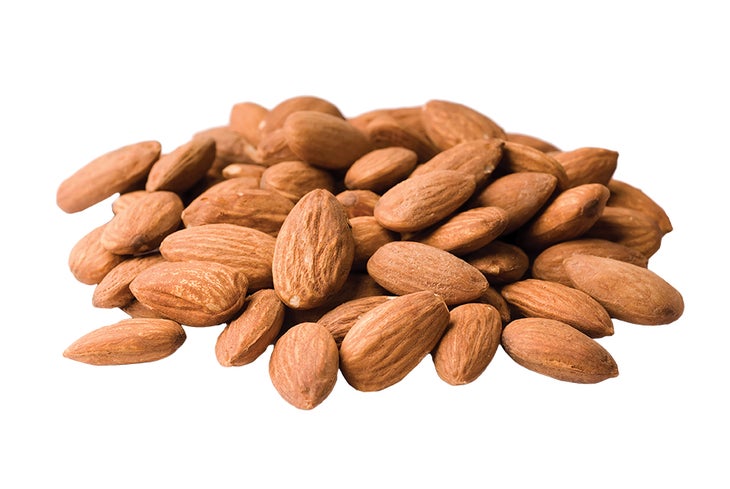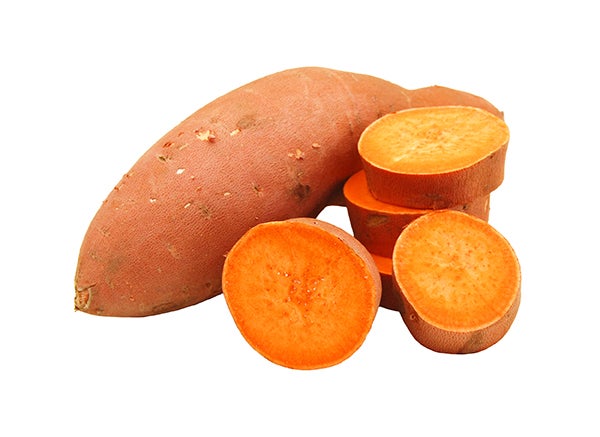Heading out the door? Read this article on the new Outside+ app available now on iOS devices for members! Download the app.
When it comes to nutrition, the best performance fuel and “ideal diet” are highly debated topics with a range of opinions and research available. For more than 20 years, I’ve clipped bolts, alpine climbed, played semi-professional tennis, and completed multiple triathlons, all the while figuring out what works and what doesn’t. In the last five years, I’ve helped athletes fine-tune their personal nutrition, from sport climbers preparing for a competition to alpine climbers training for long expeditions. The truth is, nutrition is highly individualistic, but following these simple guidelines will put you on a path to optimal performance.
Pre-Climb

- Figure out the intensity and duration of the session. You don’t want to feel deprived or too full while climbing. With shorter and higher intensity climbing like bouldering, fuel up with easy-to-digest carbohydrates (dried fruit, bananas, quick oats, rice milk, or sweet potatoes). With longer and lower intensity climbing sessions like alpine climbing, include slower digesting carbohydrates (brown rice, quinoa, or beans) for sustained energy.
- Consider the timing of the meal. Aim to get 25 to 30 grams of carbohydrates (a banana contains approximately 27 grams) 30 minutes before a climb. Include 20 grams of protein within 30 minutes of training or climbing to ensure that there are enough amino acids in the blood stream to prevent muscle breakdown and improve strength. Three ounces of turkey breast contains about 22 grams of protein, a ½ cup of tofu has about 20 grams, or you can get 14 grams of protein from two eggs.
- Avoid fats pre-workout. They are slower to digest and could cause stomach problems while working hard.
- If you eat a meal with a good balance of protein, fat, and carbohydrates one to two hours before training, you won’t need to supplement with pre-workout fuel. Have a carb-protein snack 30 minutes before if it’s been more than two hours since you’ve had a meal, or if you are putting in extra training hours. The more you train, the more nutrients you’ll need to sustain energy levels.
Mid-Climb

- For boulderers and single-pitch sport routes, aim to replenish glycogen stores, where your body gets quick energy, every 75 to 90 minutes with 30 to 60 grams of carbs. If you have trouble keeping blood sugar stable, and going longer than an hour makes you feel irritated, fatigued, or weak, then aim to refuel every 60 minutes. Going any longer without replenishing increases the risk of muscle breakdown, fatigue, and a lower performance threshold. For short, high-intensity activities like these, high-quality carbohydrates provide excellent fuel. Choose carb sources that are slower to digest, and thus won’t cause the afternoon crash. Think berries, buckwheat, wild rice, leafy greens, quinoa, sweet potatoes, yams, squash, legumes like lentils and beans, steel-cut oats, and honey or maple syrup as a sweetener. These foods are packed with vitamins, nutrients, antioxidants, and fiber, which can reduce inflammation, promote recovery, and support energy production.
- For multi-pitch climbing, consume 80 to 100 grams of carbohydrates every 60 minutes. This is important for long routes that also include hard approaches. Plan to snack at belays with dehydrated fruit like mango, apricots, or apples, nut butter packets with honey or maple syrup, jerky, trail mix, and gels.
- Remember to drink water every 30 minutes, especially when consuming concentrated snacks (gels).
Post-Climb

- Recovery starts the minute you stop training. During prolonged activity, muscle breakdown and glycogen depletion occurs. Knowing what to eat while recovering can have a significant impact on performance. When in the recovery phase, the body replenishes glycogen stores and repairs and rebuilds muscle—if you provide the necessary nutrients.
- Within 30 minutes after training, refuel with a carbohydrate and protein snack. Minimize fat intake to less than five grams; eating more than that will interfere with protein absorption and can slow digestion. Pairing .2 to.4 grams of protein per kilogram of body weight with .8 grams of carbs per kilogram of body weight will help you recover faster.
- Stay hydrated at all times, especially in the recovery phase. This is as important as the nutrients provided. Take your body weight in pounds and cut it in half; that’s how many ounces of water you should have per day, plus an additional cup for every hour of physical activity, cup of coffee, or alcoholic beverage. To make sure electrolytes are replenished as well, add an electrolyte powder to water or simply add salt to your recovery meal. Athletes can exceed the recommended daily sodium intake (1500-2400mg) because of the large amount of fluid and salt lost through sweating. Symptoms of electrolyte deficiencies and dehydration include cramping, muscle weakness, bloating, fatigue, and headaches.
Dietary Intake
Carbohydrates
50 to 60% of daily calories, with boulderers and those increasing training hours. Sport and alpine climbers can aim for 40 to 45% of daily intake.
Protein
30 to 35% of daily calories, with sport and alpine climbers aiming to have a 10 to 15% percent more carbs than protein.
Fat
20 to 25% of daily calories for boulderers, and 25 to 35% for alpine climbers and endurance athletes aiming to have a more equal amount of fat to protein ratio and lower carbohydrate intake.
No Food is “Bad” Food
Many athletes mistakenly deprive themselves of specific foods based on the latest diet trend instead of what’s best for their bodies. Cases exist where eliminating specific foods can restore health, but it can also do the opposite. Depriving the body can create nutritional deficiencies and lead to obsessive eating habits.
Carbohydrates receive a bad rap, being blamed for most digestive ailments, weight gain, and excess abdominal fat. Undoubtedly some people suffer from gluten sensitivities, but the right grains, veggies, and fruits will improve performance and promote wellness.
Optimal Weight
Achieving an optimal climbing weight can be difficult, but straightforward, healthy methods exist. Limiting refined carbs, such as white rice, white bread, baked goods and sweets, pasta, and sugar-packed snacks will help with climbing weight, performance, and health. Read nutrition labels. Most sports drinks, gels, and protein bars lack nutrients and contain excessive sugar. On long remote routes, combine real foods along with gels. Making bars from dried fruit and nuts, using honey-infused nut butter packets instead of gels, snacking on granola or jerky, and sipping coconut water or a protein shake instead of a sports drink can improve athletic function. Take the right foods to the crag instead of grabbing whatever is handy.
To maintain weight and decrease hunger, combine carbohydrate intake with protein. Consuming these two nutrients simultaneously will balance blood sugar, improve energy and mental clarity, decrease muscle breakdown, and curb sugar cravings. Hummus and veggies, berries and yogurt, tofu and brown rice, beans and rice, and chicken-topped salads all provide healthy energy and help with weight management. Divide these meals into smaller snacks to provide energy for training sessions by adjusting the serving size from a full plate to something you can grab and go.
Remember that quality of calories is more important than the quantity. Cutting out processed foods and refined carbohydrates, bulking up on veggies and fruit, and combining high-quality carbohydrates with protein will help with weight management.
The Ketogenic Diet
This trendy, high-fat diet has become popular for weight loss and improved athletic performance. Fat provides the most sustainable form of energy when trying to perform for a long time, which is why the ketogenic diet has become favored by endurance athletes. Training the body to rely on fat as the main source of fuel provides longer lasting energy without a crash, and relying on energy reserves also produces benefits like lower insulin level, improved brain health, and a decrease in chronic illness.
However, high-fat and high-protein diets are nutritionally restrictive and can cause a rebound effect—meaning your metabolism can actually slow down once you’re off it. Plus, diets that emphasize extremely low carbohydrate intake can impact endocrine health. Chronic fatigue, inability to lose weight, low libido, poor recovery in between training, and change in sleep are common symptoms of adrenal fatigue as a result of dietary restriction. It’s standard for someone on a ketogenic diet to consume about four grams of fat for every one gram of protein and carbohydrate. Nutrition and dietary choices should be sustainable to be successful, and this ratio is not. Simply tweaking current fat intake and exchanging foods can retrain the body and reap endurance benefits without risking the rebound effect. Reduce your refined carb intake, include nutrient- and fiber-dense carbs instead, combine healthy carbs with protein, and incorporate fats from nuts, seeds, avocados, coconut, eggs, flax, chia seeds, and even butter to help with weight management. These simple changes will improve physical and mental performance by providing key nutrients from the main food sources for recovery and sustained energy.
Healthy Digestion
Diets are only as good as the absorption. To gain the benefits of wholesome nutrition, make sure that your digestion is up to par.
Avoid foods that you are sensitive or allergic to. Common food allergens include gluten, milk, shellfish, eggs, soy, corn, citrus, some nuts, and nightshade vegetables (tomatoes, eggplant, white potatoes, bell peppers, and cayenne pepper). Although these foods are common allergens, it does not mean that everyone should avoid them—you might find that you have different allergies.
Track dietary habits and bodily reactions to discover allergic reactions. Note changes in bowel movement, mental fog or fatigue, skin issues, and/or increased inflammation after climbing. If you are still having negative symptoms post–food elimination, a food allergy test can uncover hidden sensitivities.
Poor digestion can also be due to a gut bacteria imbalance. Digestive tract microbiome dictate everything from mood to weight. A diet high in insoluble fiber and inulin (asparagus, artichokes, broccoli, jicama, leeks, onion, and bananas) provides plenty of prebiotics, which feed the existing bacteria. Foods high in probiotics (fermented foods like plain yogurt, kombucha, kimchi, and sauerkraut) promote a good microbiome in the gut.
Traveling can affect digestion. Most athletes complain of unintentional weight gain or changing bowel habits while traveling. To avoid this, pack plenty of “safe,” non-perishable foods such as homemade bars, nuts, and dried fruit. When visiting another country, search for less processed foods that closer mimic your typical diet. Optimal digestion while traveling requires the same discipline as when you’re at home.
Dr Elena Zinkov, ND, cofounder of Proactive Health: A Naturopathic Clinic in Seattle, works with elite athletes in digestive care, nutrition, weight loss, and pain management.